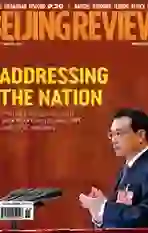Key Words for China
2014-03-28
Back in mid-March 2013, at his first press briefing as the Chinese premier, Li Keqiang disclosed that the new governments priorities would include pursuing sustainable economic growth, improving peoples standard of living, particularly that of the rural poor, as well as promoting social justice. All of these embodied the crucial tasks laid down at the 18th National Congress of the ruling Communist Party of China held in the preceding year. Naturally, citizens all over the nation are looking forward to learning about how well the government has performed during its first year.
Just as expected, on March 5, the opening day of the Second Session of the 12th National Peoples Congress (NPC), the premier delivered his maiden work report to the top legislature. He not only reviewed the efforts and accomplishments made throughout 2013, but more importantly, put forth a clear-cut roadmap to guide Chinas development in 2014.
Statistics released by Lis report showed that China has achieved remarkable progress in all the above-mentioned areas, as well as in other fields, in the past year. On the economic front, for instance, the country has surpassed the three major goals set early last year—registering solid growth amid global recession and weak market demand, putting inflation under firm control, and securing billions of new jobs. Moreover, endeavors have been made to upgrade the countrys industrial structure and transform its growth model, which will certainly help China take on a more sustainable and efficient development mode in the days ahead.
Achievements apart, the premier also spoke in unequivocal and explicit terms of the mounting hardships and challenges yet to be overcome by his government. For the purpose of tackling these issues, he outlined nine major tasks for this year, thus winding up his fairly satisfactory “report card” for the nation.
Interestingly, some local media have noted that Lis report is filled with a number of repeatedly used key words, among the most frequently employed being“development” and “reform,” mentioned 119 and 77 times, respectively. Indeed, these are the two key words that reflect the theme for China today: China needs to develop more than ever to build itself into a more powerful and prosperous state, and the key to its development lies in deepening its ongoing reforms.
